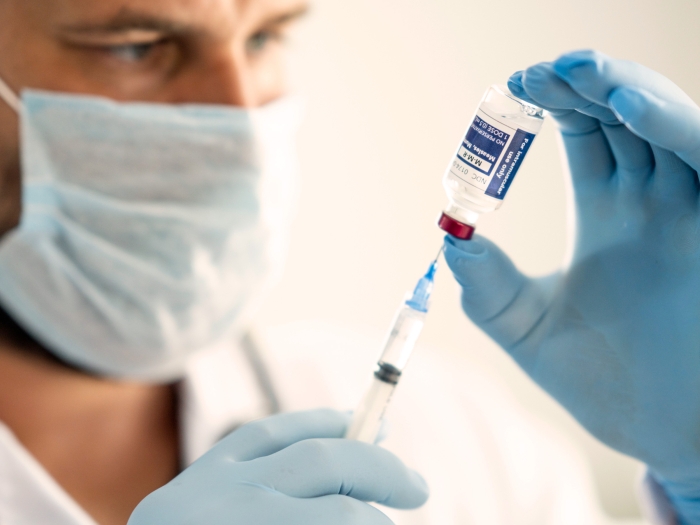From internet access to clear guidance about what kind of in-person interactions are safe, key factors could help young people continue work and school amid COVID-19.
5:00 AM
Author |

Last spring, the pandemic sent teens and young adults home from high school or college, derailed their sports and activities and sent them into "essential" workplaces that carried a new health risk. Now that summer has come and gone, though, they're facing months more of living, learning and working all while trying to have a social life in the time of COVID-19.
But what do people in their teens and early 20s need to help them get through these times?
New data from the MyVoice study, based at the University of Michigan, gives some important insights.
The text-message-based survey, which is in its fourth year, seeks to find out what it's really like to be a young person in the United States right now, with an emphasis on health-related topics.
In a new paper, a new report and newly released prepublication insights, the team probes the pandemic's effects on youth and suggests ways to help in the months ahead, says study leader Tammy Chang, M.D., M.P.H., M.S.
SEE ALSO: Study Shows New Focus Needed in Anti-Vaping Efforts for Teens & Young Adults
She and her colleagues – many of them in their teens and 20s themselves – analyzed the replies they received in several recent surveys of a diverse pool of nearly 1,000 respondents aged 14 to 24 across the country.
"The overarching theme in our data is that young people are trying to do the right thing and trying to adapt, but aren't always able to apply the rules in their real-world lives, and leaders aren't giving them clear options on how to do so," says Chang, an assistant professor of family medicine who focuses on adolescent health at Michigan Medicine, U-M's academic medical center. "People think that socialization is just leisure, but for adolescents it's required for proper development. We need to give clear messaging about safe ways to do the things young people need to do in order to grow and develop, and support them in learning and working in these times."
The overarching theme in our data is that young people are trying to do the right thing, and trying to adapt, but aren't always able to apply the rules in their real-world lives, and leaders aren't giving them clear options on how to do so.Tammy Chang, M.D., M.P.H., M.S.
Some of their key findings include:
SEE ALSO: Keeping Our Patients Safe During COVID-19
Emotional responses and coping strategies
-
One-fifth of those surveyed in March were already experiencing symptoms of anxiety or depression – suggesting a need for emotional and mental health support from family, friends and health professionals as the pandemic continues.
-
More than two-thirds described strategies they were using to cope including staying connected to friends virtually, staying busy and working to maintain their positivity.
Experiences in working and learning remotely
-
In a May survey, nearly two-thirds of respondents reported that the pandemic had changed their learning experience, mostly because of a shift to online classes. Similarly, nearly 40% said their work situation had changed – including half who said they were now working from home and many who had lost jobs or were working reduced hours.
-
Nearly 29% of those working or attending school from home said they suffered a lack of motivation or focus, or reduced productivity. But nearly 10% said that the experience was actually helping them focus more.
-
Interestingly, 44% said that learning or working at home had improved their daily routine or work-life balance, citing everything from flexible schedules to more time for sleep. But for 20% of their peers, the home-based life felt worse, including the lack of separation between work or school and life.
Needs and resource availability
-
Early in the pandemic, nearly one-third of youth reported limited access to essential needs like food, water, income and cleaning supplies – reports of virtual socialization and connection necessary to cope also suggest a need for internet or technology access
-
As the pandemic progressed and many transitioned to online school and work, one in five reported needing more resources to be successful, from internet access and computers to desks and private spaces. And nearly as many said they needed to make improvements to their personal practices, whether it was engaging in healthier habits or structuring their routines and time more.
SEE ALSO: Seeking Medical Care During COVID-19
-
Many respondents also noted that more communication and interaction with teachers and others, as well as setting clear deadlines and expectations in online learning, would help them to succeed in the virtual setting.
Reported knowledge and behaviors
-
Almost half of respondents said they had learned about COVID-19 from news media sources – but such reports are usually created by and for an adult audience. Adapting news and information for platforms that are most popular among young people could help spread accurate information more broadly.
-
Young people seem to understand their role as potential spreaders of COVID-19, even if they themselves don't get sick. Many report they are engaging in appropriate prevention behaviors, though often noting exceptions in their behaviors. More survey data on this topic and steps young people are taking – or not taking – is still being processed and will be published soon.
-
Social distancing guidance seemed to be confusing or non-applicable to many respondents who are in the age range where social interactions are vital to normal development. Chang and colleagues call for more clarity from public health officials in guidance that can tell young people what they can do safely, rather than focus on what they shouldn't do.
Study team member Eric Waselewski, M.D., is a medical resident at Michigan Medicine and lead author of the new MyVoice paper in the Journal of Adolescent Health. The topic of how young people are getting information about COVID-19, and what is motivating their behaviors regarding it, will continue to be important to study, he says.
LISTEN UP: Add the new Michigan Medicine News Break to your Alexa-enabled device, or subscribe to our daily updates on iTunes, Google Play and Stitcher.
MyVoice project coordinator Marika Waselewski, M.P.H., notes that the open-ended responses enabled by the survey's text message use were especially revealing and young adults had a lot to say about their knowledge and experiences with COVID-19. In fact, many wrote full-paragraph responses to questions.
SEE ALSO: Thrive With Your Family: Teens and the Pandemic
The time of year also likely impacts these experiences, she says, with spring-time responses including worries about missing once-in-a-lifetime milestones of the teen and young adult years, while the start of a new school year may generate more hopeful responses.
MORE FROM MICHIGAN: Sign up for our weekly newsletter
Chang and her colleagues continue to survey young people about topics related to COVID-19, from mask wearing to social distancing practices. The MyVoice survey is supported by the Michigan Institute for Clinical & Health Research, the University of Michigan MCubed program and the U-M Department of Family Medicine.
Get the latest MyVoice findings.
Paper cited: "Needs and Coping Behaviors of Youth in the U.S. During COVID-19," Journal of Adolescent Health. DOI: 10.1016/j.jadohealth.2020.07.043

Explore a variety of healthcare news & stories by visiting the Health Lab home page for more articles.

Department of Communication at Michigan Medicine
Want top health & research news weekly? Sign up for Health Lab’s newsletters today!





